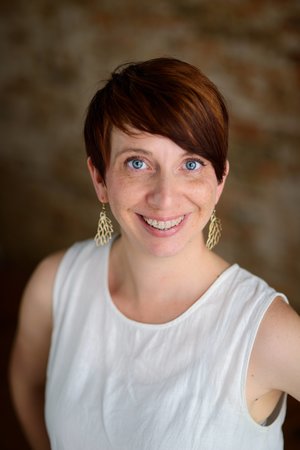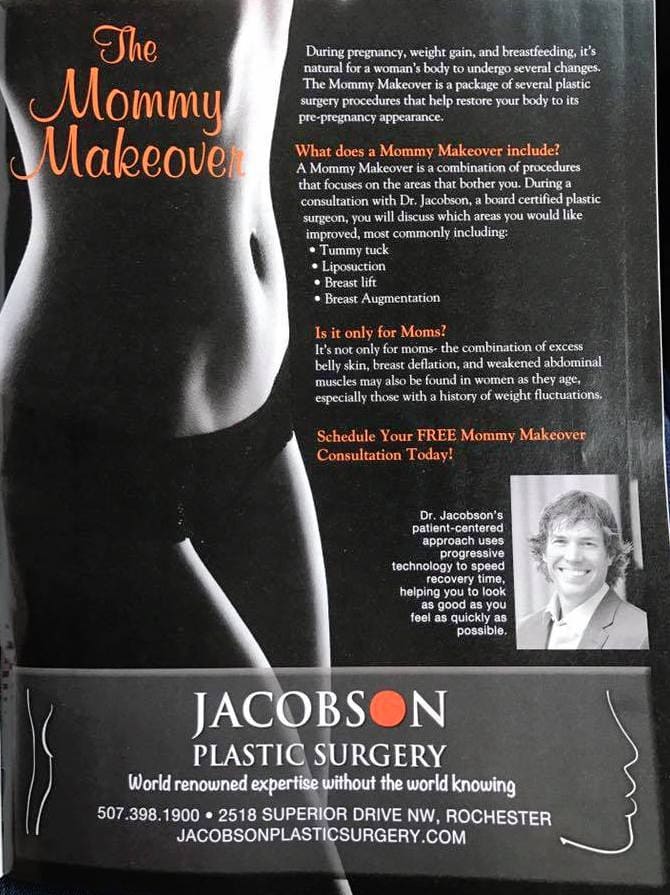 Sarah Monson is the worship arts minister at NewDay Covenant Church in Rochester, Minnesota. This open letter was original published on her blog, The Worthy People Project.
Sarah Monson is the worship arts minister at NewDay Covenant Church in Rochester, Minnesota. This open letter was original published on her blog, The Worthy People Project.
(An open letter to Dr. Jacobson, a plastic surgeon in Rochester, Minnesota)
Dear Dr. Jacobson,
First and foremost, thank you for the work you do to better the lives of people in the Rochester area (and beyond). Your work to correct and restore inherited, traumatic, and cosmetic conditions is praiseworthy.
Ultimately, I wish we lived in a world where cosmetic surgery was only practiced when medically necessary. My hope is that men and women would see themselves as worthwhile and beautiful as they are despite society’s conditions on what is beautiful and what isn’t.
On two separate occasions, I have been advised by a surgeon that I would benefit from plastic surgery. On one such occasion, it was recommended that I correct a fairly significant overbite (class II malocclusion) through surgery. The surgery was considered cosmetic rather than medically necessary. This overbite has given me a lifetime of self-loathing since I despised the way it made me look, and I was contemplating surgery in order to gain a more attractive profile.
The surgeon I spoke with told me stories of others who, after correcting their malocclusion, went on to better relationships with better-looking people, better jobs, and a more successful life.
Those stories made me feel worse about myself but more compelled to have surgery. In retrospect, those stories did exactly what the surgeon wanted—they convinced me I needed this surgery to feel good about myself. Ultimately, I did not have the surgery. Thankfully, there have been enough voices speaking positive things into my life that I have come to terms with the way I look—even so far as to appreciate how I look.
But here we are in a world where looks matter. As such, every person must live into her conscience in determining what she will or won’t do in order to attain a certain beauty or attractiveness. From coloring one’s hair, to anti-wrinkle cream, to makeup, to braces, to Botox, to plastic surgery. There are many options available. All of them reasonable and worthy.
As women, however, we are inundated with a big, loud voice that speaks to us daily. This other voice speaks to us through TV, over the radio, in print, online, and on billboards.
It’s the voice of advertising—a voice that doesn’t have to use words, but the message is loud and clear: “You are not beautiful the way you are right now.”
Of course, the main goal of advertising is to convince a person that something is wrong with their current situation and that a specific product or service will fix their problem.
Recently, I came across your ad in the Rochester Magazine. As a mother of three, I understand the dramatic changes that go on in a woman’s body during and after pregnancy. For me, the postpartum period was especially difficult. If I had seen this ad during that time I would have been devastated. It would have confirmed my own negative self-image that my breasts were too saggy, my stomach too flabby, and my butt too big.
 Is this the message you wish to speak into the minds of postpartum women (and women who are aging)? Because that’s what this ad is telling us in subtle and not-so-subtle ways.
Is this the message you wish to speak into the minds of postpartum women (and women who are aging)? Because that’s what this ad is telling us in subtle and not-so-subtle ways.
Dr. Jacobson, you are in a unique position to speak into the lives of women (and men). How will you use your voice? Will you use it to feed into negative self-talk and negative body image? Or will you use it to inspire women to see themselves in the best possible light through positive affirmation, realistic body images, and healthy habits?
How might you do so? In terms of this advertisement, I don’t know any woman who looks like the woman in this ad—either before or after pregnancy; or even after cosmetic surgery. Raising awareness of your services does not have to include the language of negative body imagery, especially in regard to the postpartum body. Simply asking the question, “Is there anything about yourself that you would like to change?” could suffice. Or, perhaps you could focus on the restorative portion of your practice such as breast reconstruction after mastectomy.
A truly patient-centered approach focuses on a positive body image—where we are now even while we progress to the body we would like to have (for whatever reason). A woman’s postpartum body is not something for which women should be ashamed. A postpartum body is to be acknowledged for what it is: life-giving!
Let’s change the way we speak about women to women. My one small voice is no match for the giant machine of advertising, but I hope my one small voice might be able to influence those in my community to join this type of conversation. Not only that, but I believe it’s in your best interest to be a part of that conversation.
Women have wised up over the years. We aren’t as susceptible to these negative messages anymore. The modern woman wishes to celebrate the strength and beauty of her body, especially through motherhood.
I want to leave you with my best wishes. I’m sure you desire that each person in your care feels empowered to be the best version of themselves. To that end, I encourage you to use your voice to speak affirming and encouraging words not only in your practice, but also in your advertising.
Again, thank you for your work in our community.
Commentary, News
The Voice That Speaks to Women
(An open letter to Dr. Jacobson, a plastic surgeon in Rochester, Minnesota)
Dear Dr. Jacobson,
First and foremost, thank you for the work you do to better the lives of people in the Rochester area (and beyond). Your work to correct and restore inherited, traumatic, and cosmetic conditions is praiseworthy.
Ultimately, I wish we lived in a world where cosmetic surgery was only practiced when medically necessary. My hope is that men and women would see themselves as worthwhile and beautiful as they are despite society’s conditions on what is beautiful and what isn’t.
On two separate occasions, I have been advised by a surgeon that I would benefit from plastic surgery. On one such occasion, it was recommended that I correct a fairly significant overbite (class II malocclusion) through surgery. The surgery was considered cosmetic rather than medically necessary. This overbite has given me a lifetime of self-loathing since I despised the way it made me look, and I was contemplating surgery in order to gain a more attractive profile.
The surgeon I spoke with told me stories of others who, after correcting their malocclusion, went on to better relationships with better-looking people, better jobs, and a more successful life.
Those stories made me feel worse about myself but more compelled to have surgery. In retrospect, those stories did exactly what the surgeon wanted—they convinced me I needed this surgery to feel good about myself. Ultimately, I did not have the surgery. Thankfully, there have been enough voices speaking positive things into my life that I have come to terms with the way I look—even so far as to appreciate how I look.
But here we are in a world where looks matter. As such, every person must live into her conscience in determining what she will or won’t do in order to attain a certain beauty or attractiveness. From coloring one’s hair, to anti-wrinkle cream, to makeup, to braces, to Botox, to plastic surgery. There are many options available. All of them reasonable and worthy.
As women, however, we are inundated with a big, loud voice that speaks to us daily. This other voice speaks to us through TV, over the radio, in print, online, and on billboards.
It’s the voice of advertising—a voice that doesn’t have to use words, but the message is loud and clear: “You are not beautiful the way you are right now.”
Of course, the main goal of advertising is to convince a person that something is wrong with their current situation and that a specific product or service will fix their problem.
Recently, I came across your ad in the Rochester Magazine. As a mother of three, I understand the dramatic changes that go on in a woman’s body during and after pregnancy. For me, the postpartum period was especially difficult. If I had seen this ad during that time I would have been devastated. It would have confirmed my own negative self-image that my breasts were too saggy, my stomach too flabby, and my butt too big.
Dr. Jacobson, you are in a unique position to speak into the lives of women (and men). How will you use your voice? Will you use it to feed into negative self-talk and negative body image? Or will you use it to inspire women to see themselves in the best possible light through positive affirmation, realistic body images, and healthy habits?
How might you do so? In terms of this advertisement, I don’t know any woman who looks like the woman in this ad—either before or after pregnancy; or even after cosmetic surgery. Raising awareness of your services does not have to include the language of negative body imagery, especially in regard to the postpartum body. Simply asking the question, “Is there anything about yourself that you would like to change?” could suffice. Or, perhaps you could focus on the restorative portion of your practice such as breast reconstruction after mastectomy.
A truly patient-centered approach focuses on a positive body image—where we are now even while we progress to the body we would like to have (for whatever reason). A woman’s postpartum body is not something for which women should be ashamed. A postpartum body is to be acknowledged for what it is: life-giving!
Let’s change the way we speak about women to women. My one small voice is no match for the giant machine of advertising, but I hope my one small voice might be able to influence those in my community to join this type of conversation. Not only that, but I believe it’s in your best interest to be a part of that conversation.
Women have wised up over the years. We aren’t as susceptible to these negative messages anymore. The modern woman wishes to celebrate the strength and beauty of her body, especially through motherhood.
I want to leave you with my best wishes. I’m sure you desire that each person in your care feels empowered to be the best version of themselves. To that end, I encourage you to use your voice to speak affirming and encouraging words not only in your practice, but also in your advertising.
Again, thank you for your work in our community.
Diana Trautwein
Share this post
Explore More Stories & News
Moving Toward Jesus Together
Basement Therapy
Jacob and the Love That Carries On
A Light That Lingers
Jotham and the Joy of Steady Faith
Formation at a Snail’s Pace
Ruth and the Courage to Remain
Journey to Wind River